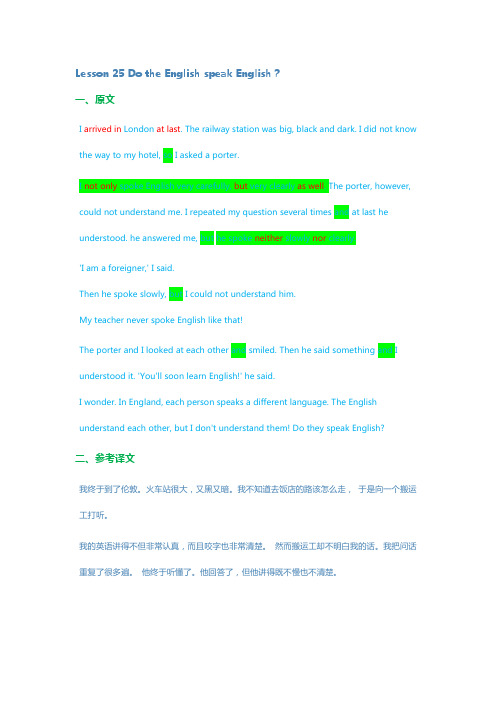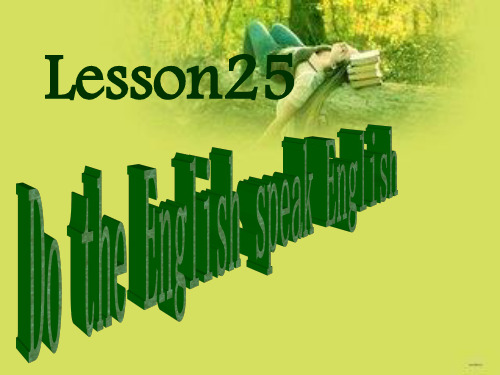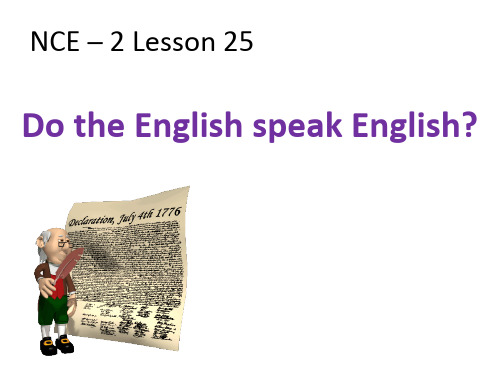新概念英语第二册 lesson25详尽版
新概念英语(第二册)-Lesson 25 Do the English speak English

Lesson 25 Do the English speak English?一、原文I arrived in London at last. The railway station was big, black and dark. I did not know the way to my hotel, so I asked a porter.I not only spoke English very carefully, but very clearly as well. The porter, however, could not understand me. I repeated my question several times and at last he understood. he answered me, but he spoke neither slowly nor clearly.'I am a foreigner,' I said.Then he spoke slowly, but I could not understand him.My teacher never spoke English like that!The porter and I looked at each other and smiled. Then he said something and I understood it. 'You'll soon learn English!' he said.I wonder. In England, each person speaks a different language. The English understand each other, but I don't understand them! Do they speak English?二、参考译文我终于到了伦敦。
新概念英语第二册 lesson25详尽版

新概念英语第二册lesson25 Do the English speak English?标题: 在这里均为名词,但意义不同。
第 个指“英国人”,为总称,后面的动词必须用复数第 个指“英语”。
指语言时前面不加冠词,指人则要加 :还可以作形容词,表示“英格兰的”、“英国的”、“英国人的”等;单词:★铁路 路,途径 扶手,栏杆,围栏:火车站 公路 地铁★ 几个可数名词复数 不可数名词可数名词复数 = 一些):一些 即可以修饰可数,又可以修饰不可数… 大量的一段时间 一段时间以前某时 有时 偶尔★ 外国人 蓝眼睛外国人①外国的,海外的外国留学生: 洋货: 外交事务:②陌生的★ 感到奇怪① 对 事情感奇怪② 想要知道③ 对什么感到怀疑你对什么感到疑惑呀?④ … 难怪…奇观世界古代七大奇观极好的练习: 我想知道她什么时候能来。
不知道为什么仓库今天关门了。
我在想你会不会帮我。
’这是个巨大的奇迹。
’课文:大地方 小地方表示到达:强调努力的结果表示一种结局次序上的最后黑暗的( )深的( )忧郁的( )…… … ………… 不仅…而且…他不仅自编剧本,还饰演其中的角色。
这个年轻人不仅聪明,而且很勤奋。
练习: 他不但很聪明,而且很勤奋( )。
他不但吸烟,而且喝酒。
她不但会说 英语,而且会说德语。
这个短语本身的含义是“也”、“又”、“还”:玛丽不仅找到了她姑妈,而且还在她那里住了两星期。
连接整个谓语如果你明天回家,我也回。
他把钢笔借给了我,还有字典。
既不 也不 两者都不(用 … …连接并列主语时,谓语则随最后一个主语的人称和数而变 就近原则)若将 句型变为肯定句,只需把 改为 即可,同时谓语动词必须用复数形式。
练习: 她既不胖也不瘦。
我既没有给他打电话,也没有给他写信。
我既没有钱也没有时间去旅游。
更强调个人或个别, 更强调全体或全部语法:并列句 把两个或几个简单句用并列连词连接起来,则成为一个并列句。
’’’’表示并列关系的并列连词,这类连词主要有 …… … … 等。
新概念英语第二册课件(Lesson 25 Do the English speak English)

1、Do the English speak English?
English:n. 英语,英国人,英格兰人
adj. 英国的,英格兰的
the English 统称英国人,所以助动词用复数
问题的答案: the answer to the question
大楼的入口:the entrance to the building
都表示一种由此及彼的方向。
4、I not only spoke English very carefully, but very
clearly as well. not only...but...as well = not only…but also…
yet [jet] adv. 然而、还,放在句末或句中, 与否定句, 疑
问句相连, 并且与现在完成时用得比较多 eg. Have you finished yet? yet=but 连词,放在两个句子间, 起转折作用
eg. They broke up several times, but married in the
end finally 一种次序上的最后
firstly, secondly, finally
3、I did not know the way to my hotel, so I asked a porter. the way to: to 是介词,介词短语充当the way的定语,表…的意思,类似的如: 房门的钥匙: the key to the door
不但……而且……
eg. I can speak not only Chinese but English as well. Not only you but also I will go there. 主语并列(一般不这么用) not only喜欢放在动词的前面,一般遇到实义动词和非实 义动词的时候, 习惯放在两者之间 eg. I can not only speak Chinese but English as well. (更习惯的说法)
新概念英语第二册 Lesson25~48词组回顾- 带答案

1.抵达___arrive__ __at___/__in______= __get___ __to____ =__reach___2.去酒店的路the ___way___ __to____ the ___hotel___3.不仅...而且__not___ __only__....___but___ ...___as___ __well___4.重复...几次__repeat___ ...__several___ ___times__5.既不...也不... _neither_... ___nor_6.外语__foreign____ ___languages_____7.相互看__look____ __at____ __each____ ___other____8.终于__at__ ___last____9.英国人__the___ _British____10.好看的图案_pretty____ _patterns_11.以相同的方式__in___ the ___same_ _way___12.窗帘布_curtain__ _material___13.欣赏现代艺术__appreciate___ __modern__ __art___14.是...否... __whether___ ...__or___ __not15.快到傍晚的时候___later_ __in____ the afternoon16.搭帐篷___put___ __up___ ___a____ __tent___17.开始下雨___begin___ to____ _rain____= _begin___ _raining___18.爬进帐篷__creep___ __into_ one's ___tent___19.睡得香___sleep____ _soundly___20.半夜__in___ the __middle_ _of____ the ___night___21.满是;充满be __full____ __of____ = be __covered___ with_____22.养成好习惯___form__ a __good__ __habit__23.正好从...下面流过___flow__ __right__ _under___ ....24.熄灭___put___ ___out_25.无法容忍can't __put___ __up____ __with__26.延迟__put____ __off__27.放好,收好__put_ __away___28.罕见的疾病a __rare___ disease29.相信古代神话__believe___ __in______ __ancient______ __myths_____30.自从___ever____ __since____ ...31.与...有冲突__have___ ___trouble___ __with___32.能够做... be __able___ ____to___ do ...33.不能做...be ___unable__ ___to__ do ....34.张贴“禁止停车”的通知__put_ ____up__ “No Parking”__signs___35.有效果__have___ _effect____36.把...变成... __turn____ ...____into___ ....37.不同寻常的出租车___an____ __unusual____ taxi38.开启了一项新业务__start_ a new ___service____39.一架小型瑞士飞机a ____small_ _Swedish___ __aeroplane__40.搭载八名乘客___carry__ ___eight__ __passengers__41.最让人惊讶的事情_the__ ___most___ ___surprising___ thing42.耕过的地里a __ploughed___ ___field____43.从...飞往... ___fly__ ___from____.... ____to___...44.一栋公寓楼的屋顶上the _roof_____ ___of____a __block_____ of __flats/apartments____45.废弃的停车场a __deserted____ car ______park__46.拒绝了...的请求___refuse____ a ___request____ ___from____ sb47.孤岛___a____ __lonely____ __iland____48.大西洋__the____ _Atlantic__ Ocean49.横穿公园的小河a __river___ _that___ ___cuts____ __scross___ the park50.在河边___by___ the ___river____51.在天气晴朗的下午____on__ ___fine___ _afternoons____52.向往常一样_as___ ___usual___53.用力踢球__kick____ the ball ___gard___54.经过的船只__passing____ __boats____55.用力打在他身上__strike____ him _hard_____56.冲...大喊_call___ __out___ ____to___ sb57.扔回_throw______ _back___58.年轻时的经历one’s __young____experience__ _____as___ a young man59.院长the _____head___ ___of_____ a hospital60.过去常常... __used______ ____to____ do61.多年积蓄___save_____ ___up____for_ years62.他自己的工作室a ___workshop_____ ______of__ his ___own_____63.在他20多岁的时候____in____ __his______ _____twenties___64.飞机配件____spare____ ____parts____ ____for___ aeroplanes65.漫长的成功之路one’s ____long____ _____way___ ___to_____ __success______66.修自行车___repair_____ ____bicycles________67.经验丰富的工人_____experienced______ ____workers____68.不如以前... not____as____/__so____ .... ___as_____ ...once...69.偷盗的诱惑the ____temptation___ to ____steal____70.尤其在大的商店里___especially___ _____in___ ____large____ shops71.选了店里最贵的一条裙子____choose____ ___one_____ of the ____most____ ___expensive_____ _____dresses___ in the shop72.把...包起来_____wrap___ sth up73.尽快____as____ _____soon___ ___as_____ _possible______ = ______as__ _____soon___ __as____ one ___can_____74.被逮捕be ___arrested_____75.发现,查明____find____ ____out____76.讲述她自己的遭遇____explain____ ___what_____ had ____happened____ __to______ her77.从海岸出发____set____ __out______ __from______ the ___coast_____78.遇到暴风雨be ___caught_____ ____in____ a ____storm____79.天将黑时___toward_____ ____evening___80.游(飞/走/跑)了八英里___cover_____ a __distance______ ____of____ 8 ____miles____81.在悬崖上____on____ the __cliff______82.一到岸边__on______ ____arriving____ at the shore83.挣扎着往峭壁爬去__struggle______ __up______ the ____cliffs____84.几天前___a___ _____few___ days ago = __several______ days____ago____ = the __other___ ___day__85.当地警局the __local____ ___police____86.拜访某人____call____ __on_____ sb87.参观某地___call____ ____at___ sp88.担心... be ___worried___ __about_____ sth/sb = __worry_____ _about______ sb/sth89.被警察找be ___found__ _____by____ the ____police___90.无意中找到;捡起;用车接____pick___ ___up_____91.400英里外的一个小村庄a small __village_____ 400 _miles______ _away____92.期待自行车被找到__expect___ the __bicycle____ to __be_____ ___found_____93.取消___call_____ __off______94.打电话__call_____ sb __up_____95.后悔做了..._regret______ ____doing___96.觉得...令人兴奋的多____find__ ... ____far____ __more_____ __exciting______97.冲出商店__rush_____ ____out_____ _______of__ the shop98.装满钱的袋子a ____bag_____ ____full_____ ____of_____ money99.吓了一大跳__get____ such a __fright_______100.开车逃走____run_____ ____away_____ ______in___ one’s car101.开车撞... _______drive__ one’s car ___at______...102.受损严重be ____badly_____ _damaged_____103.容易认出____easy___ to ___recognize_____104.横渡英吉利海峡swim ___scross____ ____the__ English __Channel____105.创一项新的世界纪录___set___ __up_____ a new _world_____ __record__106.一定会成功be ___sure____ _to____ __succeed____107.训练某人做..._train____ sb ___to_____ ____do____108.打算做... _intend____ ____to____ __do______ =___plan______ ____to_____ __do_______109.喝点东西___have_____ ____something____ __to_______ drink110.固体食物______solid___ ___food______111.四年之后_____in____ 4 _____years____112.许多人a _____great____ _____many____ people113.安全标准_____safety____ _____standards____114.铁路专线a ___special______ ____railway_____ ___line______115.到年底______by___ the _______end__ of this year116.由...所设计be ____designed_____ ___by______117.期待做... _____expect____ __sb_______ ____to_____ ____do_____ ...118.用词典查词____look_____ _____up____ words in the dictionary119.当心__look_______ ____out_____120.梦想做;考虑做____dream_____ __of_______ _____doing____121.安顿下来___settle______ _____down____122.抱怨... ___complain______ _____about/of____123.即使______even___ _____if____ =______even___ ____though_____124.经常下雨______rain___ __continuously_______125.刺骨的冷be ___bitterly______ ___cold______126.感到震惊_____get____ a ____shock_____127.除了天气____except_____ the _____weather____128.超出了他能忍受的程度___more______ ______than___ he could______bear___ 129.在乡下______in___ the ___country______130.一...就... ___no______ ____sooner_____ ... than...131.几乎未来得及...就... ____hardly_____ ...__when______132.拒绝做... ______refuse___ ______to___ ____do_____133.做腿部手术have ____an_____ __operation_______ on one’s __leg_______134.第二天the ___other______ day= the ___following______ day135.要求... ____ask___ _____for____136.询问... ____inquire_____ ___about______137.特病的病人a _____certain____ ______patient___138.允许某人做... _____allow____ sb ____to_____ _____do____139.再住两个星期院_____stay____ _______in__ ____hospital_____ ____for_____ ____another_____ 2 weeks140.病人的亲属a ___relative______ ____of_____ the __patient_______141.穿着黑色紧身连衣裙的身材高大的严肃的女士 a ___large___ _____unsmiling____ ___women______ ____in_____ a _____tight____ black dress142.抬头___look______ ____up_____143.眼睛盯着...one's eyes are ___fixed______ on ...144.交谈___make____ ____conversation_145.多吃_eat_____ ____more_____146.少说____talk____ _____less____147.绝望地____in____ ____despair____148.喧闹___make____ ___noise_____149.承诺____make____ a____promise150.取得进步___make_____ _progress______151.赚钱_____make___ ___money_152.演说__make_____ a __speech_____153.犯错____make____ a __mistake____154.下定决心___make_____ __up____ one’s ___mind____155.帮...忙__do_____ sb a _____favour____156.买东西____do_____ some ____shopping_____157.生意好_____do___ a good _____business___158.对...无礼be ____rube_____ ___about______ sth to sb159.照镜子look at oneself ______in___ the _____mirror____160.提醒某人.... ___remind______ sb ____of_____ ....161.看起来像___look______ _____like____162.被...覆盖be ____covered_____ ____with_____163.弹奏曲子_____play____ a ___tune______164.第一次瞥见______catch/have___ one's first ___glimpse______ of ...165.从...里面爬出来____rise_____ ______out___ of ...166.随着...动_____follow___ the ___movement______ of167.分辨出...和...的区别____tell_____ the ___difference______ ____between_____ ..._________ ...168.挑选出... __pick____ __out______169.取包裹__pick_______ ____up_____ one’s _____parcel____170.飞越北极the____flight____ _____over____ the______North___ ____Pole_____171.飞越南极_____fly____ ___over______ the____South_____ ___Pole____172.拍了很多照片___take____ ______a___ great_____many____ photographs173.遇到麻烦____run_____ ____into_____ ____trouble_____174.在某个地方______at___ ____one____ ____point_____175.看起来肯定... It ______looks___ ____certain_____ that...176.上升至10,000英尺____rise_____ _____to____ 10,000 feet177.立刻_____at____ ____once_____ /right away178.命令某人做... ____order_____ sb _____to____ ____do_____179.看得见,在视线里______in___ ___sight______180.越过群山____clear_____ the______mountains________181.毫无困难____without_____ ___difficulty______182.目前_____at____ __present_______183.不管怎么说____at____ ______any___ _____rate____184.本质上______at___ _____heart____185.困惑不解;茫然不知_____at____ _____a____ _______loss__186.有时_____at___ ______times___187.冒风险做...______take___ the___risk______ ___of______ ___doing______ sth188.穿过深林run ___through______ the forest189.冲向他_____run____ ____up_____ ___to______ him190.在森林边上_____at____ the _____edge____ of the forest191.在挣扎(打斗)中_____in____ the_____struggle____192.为某人所有_____in____ one's ___possession______193.气喘吁吁____out_____ ____of_____ ______breath___194.追上...____catch_____ ___up______ ____with_____ sb195.径直向某人跑去run ___straight______ ____at_____ sb196.翻看;浏览______look___ ____through_____197.包里的东西the___contents______ _of________ the bag198.电影的内容the____content_____ _____of____ the film199.需要缝补_____need____ ___mending______200.问心无愧a _____clear____ ___conscience______201.一大笔钱______a___ ______large___ _sum________ _____of____ money202.丢了be ____lost_____ = be/get/go ____missing_____203.一定被...偷了____must_____ ______have___ ___been______ _____stolen____ by... 204.把...还给某人___return______ ...______to___ sb205.用报纸包着be _____wrapped____ ______up___ ______in___ newspaper206.含有一半他丢的钱____contain_____ _____half____ the money he had ____lost_____ 207.连同,加之_together_______ ___with______208.偿还be ____paid_____ ____back_____209.抢银行______rob___ the____bank_____210.抢他的钱____rob_____ him______of___ his money211.装有服装的木箱__wooden_______ boxes ____containing_____ _clothing________ 212.解释,说明____account_____ ____for_____213.极其重be ___extremely_____ ___heavy____214.浮现在某人脑海中__occur_____ ______to___ sb215.惊讶于他看到的be ____astonished___ ____to_____ _____discover___what_ he had _____seen____216.一堆毛织品a_______pile___of__ ____woolen_____ _____goods____217.承认做了___admit____ ___doing______218.被关(闷)在... be ___confined____ ___to______219.支付旅费3500英镑____pay____ £3500 ______for___ the _____cost____ of the__trip_____220.供出售be____up_____ ____for_____ ___sale______221.某地闹鬼sp be ___haunted______222.奇怪的声音a____strange____ __noise______223.被...堵住be ____blocked_____ ___by______224.关灯____turn___ the lights____off_____225.摇头_____shake___ one's __head_____226.赠送____give_____ ___away______227.拔牙____pull_____ _____out____ one's teeth228.休息一会儿____rest____ __for_______ a _____while____229.充满be ____filled_____ _____with____230.越来越多的收集a ___growing______ ____collection_____231.作为对...的回应_____in____ ______response___ ____to_____232.要么...要么... __either_______ ..._____or____ ...233.把药棉从嘴巴里取出来______remove___ the ____cotton_____ _____wool___ _____from____ one’s mouth。
新概念第二册Lesson 25 Do the English speak English讲义

新概念第二册Lesson 25 Do the English speak English?一、单词精讲railway /'reɪlweɪ/【释义】n.铁路【例句】There's a new railwav now from London to Paris.如今从伦敦到巴黎有了条新铁路。
【搭配】railway station 火车站【联想】subway n.地铁← railway → highway n.公路porter /'pɔ:tə/【释义】n.搬运工,行李员【例句】She called a porter to help her with the heavy luggage.她叫来一个搬运工帮她搬运沉重的行李。
【联想】reporter n.记者← porter → portable adj. 轻便的several /'sevərəl/【释义】quantifier 几个,若干【例句】Several questions remained unanswered.还有几个问题没有解答。
【辨析】several,some1. several 后只能接可数名词。
There are several books on the table.(桌子上有几本书。
)2. some 后可接可数名词,也可接不可数名词。
如:We need some expert help.我们需要一些内行的帮助。
There are some apples in the basket.(篮子里有一些苹果。
)(接可数名词)I need some time to think about it.(我需要一些时间来考虑它。
)(接不可数名词)foreigner /'fɒrmə/【释义】n. 外国人【例句】There are many foreigners here.这儿有很多外国人。
【联想】foreigner → foreign adj.外国的wonder /'wʌndə/【释义】vi. ① 感到奇怪【例句】I was just wondering我只不过是好奇而已。
新概念二 L25

§ Lesson— 25 Do the English speak EnglishI arrived in London at last. The railway station was big, black and dark. I did not know the way to my hotel, so I asked a porter. I not only spoke English very carefully, but very clearly as well. The porter, however, could not understand me. I repeated my question several times and at last he understood. he answered me, but he spoke neither slowly nor clearly. 'I am a foreigner,' I said. Then he spoke slowly, but I could not understand him. My teacher never spoke English like that! The porter and I looked at each other and smiled. Then he said something and I understood it. 'You'll soon learn English!' he said. I wonder. In England, each person speaks a different language. The English understand each other, but I don't understand them! Do they speak English?一、生词和短语1、railway n. 铁路railroad : 铁路railway/railroad station : 火车站2、porter n. 搬运工3、several 几个some:一些, 即可以修饰可数, 又可以修饰不可数several:只能修饰可数=a number of(一些) a great number of : 大量的4、some time:一段时间some time ag0 一段时间以前sometime: 某时(用于将来时)I will defeat you sometime. (总有一天我将打败你) sometimes:有时, 偶尔= occasionallysome times : 几次several times : 许多次5、foreigner n. 外国人foreign language foreign country6、wonder想知道①I wonder if you have any spare time. I wonder what time it is.I wonder why you are late. I wonder where you are going.②wonder at sth.对...事情感奇怪: I wonder at this.wonder n.奇观: It's a wonder./ The Great Wall is one of seven wonders in the world.wonderful adj 极好的7、just就是He is just cool. It is just beautiful. He just dropped everything.It is just ten o’clock. I had a bath just now.He is just a child. I live just round the corner. That's just what he wanted.二、课文讲解1.arrive in : 到达, reach, get arrive at : 小地点, arrive in; 大地点When will you reach(arrive in\ get to) BeiJing?get to+宾语: 到达When will you get to BeiJing?get home:到家, get there : 到那home/there/ here都是副词, 副词跟动词连用的时候不需要加介词, 但一般不用reach.2.balck : 颜色(建筑物). The room is black.dark : without light.没有光线The room is dark.3.the way to : 通往...路Can you tell me the way to the museum.4.know sth. well:很熟悉I know the boy well.5.not only...but...as well : 不但...而且...I can speak Chinese. I can speak English.I can speak not only Chinese but English as well. I not only sing but dance as well.not only,喜欢放在动词的前面一般遇到实义动词和非实义动词的时候, 习惯放在两者之间I can not only speak Chinese but English as well. (更习惯的说法)I not only like my mother but my father as well.however, 可以直接放在句首, 也可以放在句子中间, 独立成句。
新版 新概念英语二册讲义--25

•
I'll stay here for some time.
• (2)凯特将在2月某个时候回来。
•
Kate will be back sometime in February.
• (3)我去过巴黎好几次了。
•
I have been to Paris some times.
• (4)琼步行上学,但有时也骑自行车去。
4. I not only spoke English very carefully, but very clearly as well.
Great Pyramid of Giza; 埃及胡夫金字塔 Hanging Gardens of Babylon; 巴比伦空中花园 Temple of Artemis at Ephesus; 阿尔忒弥斯神庙 Statue of Zeus at Olympia; 奥林匹亚宙斯巨像
•Mausoleum at Halicarnassus; •摩索拉斯基陵墓
a number of times
some times
some+可数/不可数 一些
some flowers 一些花
some milk
一些牛奶
• some time • some times • sometime • sometimes
一些时间 好几次 adv. 某个时候 adv. 有时,偶尔
• (1)我将在这儿呆一段时间。
wonder at sth. We wonder at the beauty of the old town.
2. vt. & vi.(对……)感到疑惑/怀疑, 想要知道
wonder about sth 对…感到疑问
新概念英语第二册Lesson25课 课件(共43张)

Listen to the tape once
arrive
arrive reach get arrive vi.
arrive at:小地点,arrive in;大地点 When will you arrive ______ Beijing? I arrived ______ the bus stop at five o’clock.
know sth. well 对……很熟悉 I know the boy well.
like
Like prep.,表示“像,像……一样” There’s no one like you. 没有人像你一样。 He speaks like a foreigner. like v. walking / would like to go at last/ finally/ in the end
Guessing Game:
1. Who is he / she? 2. Which city does he/ she come from? 3. What is his/her nationality? 4. What does he / she do? 5. What language does he / she speak?
并列句(compound sentence):
把两个或几个简单句
用并列连词连接起来,
则成为一个并列句。
I turned on the TV. I watched it.
I turned on the TV and
并列句
watched it.
I bought my sister a present.
reach vt.后面一定要加宾语 When will you reach Beijing? I reached the bus stop at five o’clock.
新概念英语第二册-Lesson25知识讲解PPT共67页

谢谢!
36、自己的鞋我们唯一不会改正的缺点是软弱。——拉罗什福科
xiexie! 38、我这个人走得很慢,但是我从不后退。——亚伯拉罕·林肯
39、勿问成功的秘诀为何,且尽全力做你应该做的事吧。——美华纳
40、学而不思则罔,思而不学则殆。——孔子
新概念英语第二册-Lesson25知识讲解
11、获得的成功越大,就越令人高兴 。野心 是使人 勤奋的 原因, 节制使 人枯萎 。 12、不问收获,只问耕耘。如同种树 ,先有 根茎, 再有枝 叶,尔 后花实 ,好好 劳动, 不要想 太多, 那样只 会使人 胆孝懒 惰,因 为不实 践,甚 至不接 触社会 ,难道 你是野 人。(名 言网) 13、不怕,不悔(虽然只有四个字,但 常看常 新。 14、我在心里默默地为每一个人祝福 。我爱 自己, 我用清 洁与节 制来珍 惜我的 身体, 我用智 慧和知 识充实 我的头 脑。 15、这世上的一切都借希望而完成。 农夫不 会播下 一粒玉 米,如 果他不 曾希望 它长成 种籽; 单身汉 不会娶 妻,如 果他不 曾希望 有小孩 ;商人 或手艺 人不会 工作, 如果他 不曾希 望因此 而有收 益。-- 马钉路 德。
新概念英语第2册Lesson25~27课文详注

新概念英语第2册Lesson25~27课文详注新概念英语第2册Lesson25课文详注1.Do the English speak English? (标题)英国人讲的是英语吗? English在这里均为名词,但意义不同。
第1个指“英国人”,为总称,后面的动词必需用复数;第2个指“英语”。
指语言时前面不加冠词,指人则要加the:The English often talk about the weather.英国人常常谈论天气。
Do you speak English?你会讲英语吗?English还可以作形容词,表示“英格兰的”、“英国的”、“英国人的”等:He was English.他是个英国人。
与English相像的单词有French,Chinese,Japanese等:I said good morning to him in French.我用法语向他问早上好。
2.I arrived in London at last. 我最终到了伦敦。
(1)这里London前面不加冠词,介词in暗指London是个大地方。
(2)at last为固定短语,表示“最终”,一般暗指经过一番等待、麻烦(苦恼)或努力之后:It was my turn at last.最终轮到我了。
I repeated my question several times and at last he understood.我把问话重复了许多遍。
他最终听懂了。
3.I did not know the way to my hotel…我不知道去饭店的路该怎么走……my hotel不是指属于我的饭店(或旅馆),而是指我已订了房间或者要去住的饭店。
4.I not only spoke English very carefully, but very clearly as well.我的英语讲得不但特别仔细,而且咬字也特别清晰。
not only…but…as well这组连接词与 not only…but also是同样的意思,都表示“不但……而且……”,not only与 but后面的成分必需对等。
新概念英语第二册 lesson25详尽 版

新概念英语第二册 lesson25 Do the English speak English?标题:English在这里均为名词,但意义不同。
第1个指“英国人”,为总称,后面的动词必须用复数;第2个指“英语”。
指语言时前面不加冠词,指人则要加the:English还可以作形容词,表示“英格兰的”、“英国的”、“英国人的”等;单词:1.★ railway n.rail(铁路)+way(路,途径) rail 扶手,栏杆,围栏railway/train station:火车站 highway 公路 subway 地铁2. ★ several 几个few+可数名词复数 little+不可数名词several+可数名词复数=a number of(一些)several times: I repeated my questions several times.some 一些即可以修饰可数,又可以修饰不可数a great number of… 大量的some time 一段时间 some time ago 一段时间以前sometime adv. 某时 sometimes adv. 有时, 偶尔3.★ foreigner n. 外国人a blue-eyed foreigner 蓝眼睛外国人foreign adj.①外国的,海外的外国留学生:foreign students洋货:foreign goods外交事务:foreign affairs②陌生的e.g. The subject is foreign to us.4.★ wonder v. 感到奇怪① wonder at sth. 对...事情感奇怪I wonder at the beauty of the old town.② I wonder 想要知道: want to knowI wonder if you have friend.③wonder about sth. 对什么感到怀疑what are you wondering about?你对什么感到疑惑呀?④No wonder that… 难怪…No wonder that he is the top student, he works so hard everyday.wonder n. 奇观Jane is a wonder. She never fails in her examinations.the seven wonders of the world in ancient times 世界古代七大奇观wonderful adj. 极好的e.g.I would be a wonderful wife.练习:1. 我想知道她什么时候能来。
新概念英语第二册Lesson25dotheEnglishspeakEnglish课件

Words and phrases
1. English n. 英语(不加冠词) adj. 英国的,英国人的
the English=the English people (pl.) 英国人(英格兰人) the British 英国人(英格兰人、爱尔兰人、苏格兰人、威尔士人) Englishman---Englishmen 英国人 Englishwoman---Englishwomen 英国人 eg: .Do you speak English?
/5sev[r[l / /5fCrIn[ / /5wQnd[/
n.铁路 n.搬运工 quantifier.几个 n.外国人 v.感到奇怪
Look, listen and answer
Q1: Where did the writer arrive? Q2: Why couldn’t the writer understand the porter? Q3: Why does the writer wonder?
.The English often talk about the weather. .He was English. 与English相似的单词有: French, Chinese, Japanese等。
Words and phrases
2. wonder vt. vi. 感到惊讶, 感到怀疑,想知道 wonder at 对…感到惊讶 wonder +宾语从句 eg: . I wonder at his rudeness. . I wonder who he is. . I wonder when she will come. . I’m wondering if you could help me. . They wondered why there was a modern building in that district.
新概念英语第二册第25课Lesson 25-new精编版

_d___ I understood.
• a) who • b) whose • c) whom • d) which
• c) overseas
• d) abroad
My teacher never spoke English like that!
• like:prep.像 • He is very like his father. • 她一定也不像她的妈妈 • She looks nothing like her mother. • Like father,like son. • 有其父必有其子
②陌生的 e.g. The subject is foreign to us.
Adj.+er→n. strange→stranger foreign→foreigner light→lighter(打火机)
Question 10
I come from
• a) foreigner
abroad.I am _a____. • b) strange
Question 6
The porter and I looked at each
other.__c___ both
smiled.
• a) I • b) He • c) We • d) They
Then he said something and I understood it.
Question 7
快速通道(主要指城市内的,例如高架桥)
high way
free way
rail: n.扶手,栏杆,围栏
• 出轨: Jump the rail • 楼梯的扶手 : • stair rails • ride the rails • 逃火车票 • 火车站 • railway station
新概念英语第二册Lesson25课件

Lesson 25 Do the English speak English? 重难点巩固
I wonder. In England, each person speaks a different language(语言). ①wonder 想知道/感到奇怪; wonderful 精彩的/令人惊奇的 →I wonder how did they came here. 我想知道他们是怎么来这里的。 →The Greenwood Boys gave us a wonderful performance last night. ②each (2者或以上中的每一个, 可单独用, 也可each of)
foreigner外国人
like that 那样地
each other相互
smile(名动一体)微笑
smile at ... 对......微笑
wonder 想知道/感到奇怪
wonderful 精彩的/令人惊奇的
each of ... ......中的每一个
clearly 清晰地/易懂地/显然地
each用于复数主语后,谓语动词用复数
Lesson 25 Do the English speak English? 重难点巩固
He answered me, but he spoke neither slowly nor clearly. ①neither...nor意为“两者都不”,全部否定,谓动遵循靠近原则,即nor后面的主语决定。 →Neither Tom nor I am a football player. 汤姆和我都不是足球运动员。 →He neither drinks nor smokes. 他既不喝酒也不抽烟。 ②neither of + 复数 + 动词单数形式 (注意: 不管是什么复数,谓动都用单数形式) →Neither of us speaks English. 我们俩都不说英语。 →Neither of the girls is from the UK. 这两个女孩都不是来自英国的。 ③neither/nor引导倒装句,表示和前面的情况一致,而且前面为否定句。 →I haven’t had dinner. Neither has he. 我还没吃过晚饭。他也没有。 →Jenny doesn’t like that. Nor do I. 珍妮不喜欢那样。我也没有。 [翻译]: 我妈妈和我都不喜欢钓鱼。[翻译]: 他俩都不吃海鲜。 [翻译]: 他们没写作业。我也没写。[翻译]: 她不会来的。Mike也不会。
(完整版)新概念第二册Lesson25

一个人 a Chinese a Swiss an Australian a Russian an Italian a Greek a Frenchman a Japanese an American an Indian a Canadian a German an Englishman a Swede
两个人 two Chinese two Swiss two Australians two Russians two Italians Greeks
two Frenchmen two Japanese two Americans two Indians two Canadians two Germans two Englishmen two Swedes
• I repeated my question several times and at last he understood.
• he answered me, but he spoke neither slowly nor clearly.
• I am a foreigner, I said.
• The great wall is a man-made wonder.
• n. 奇迹
• adj. wonderful 令人惊奇的,奇妙的
several 几个
few+可数名词复数 • little+不可数名词 • several+可数名词复数 • several times • I repeated my questions several times.
英语中的一些常见俚语。
put oneself in one’s shoes
设身处地为他人着想
keep oneself under one’s hat 守秘密
新概念第二册Lesson25

eg. It is a wonder that he survived the plane crash. 他在空难中幸存下来,真是个奇迹。 and no wonder / and little wonder (用来强调前面的句子)不足为奇,难怪 eg. He declined our offer, and no wonder. 难怪他拒绝了我们的给予。 decline [di'klain] vt. & vi.辞谢; 谢绝(邀请等) a nine-day wonder 一时的轰动 No wonder that… / It is no wonder that… 难怪… eg. No wonder you were late!
4) He answered me. He did not speak slowly. He did not speak clearly. (but...neither...nor) 他回答我了,他讲话既不慢也不清楚。 >He answered me but he spoke neither slowly nor clearly. 5) I knocked at the door. He didn't open it. (but) 我敲了门,他不开。 一>I knocked at the door but he didn't open it. 6) He went on holiday .I went on holiday. (both...and ) 他去度假了。我去度假了。 >Both he and工went on holiday. 他和我都去度假了。 7) He must be mad. He must be very wise. (either...or) 他一定是疯了。他一定是聪明的。 一>He must be either mad or very wise. 他或者是疯了,或者是聪明的。
新概念英语第二册 Lesson 25课件

并列句(compound sentence):
➢He teaches English, I teach English. ➢He teaches English and I teach English too. ➢He teaches English and so do I. ➢both...and ➢Both he and I teach English. ➢Mom is a manager. Dad is a manager. ➢Both mom and dad are managers. ➢我吃了一个蛋糕。Sam吃了一个蛋糕。 ➢Both he and I ate a cake.
iarrivedinlondonatlasttherailwaystationwasbigblackanddarkblackanddark又黑又暗blackandblue青一块紫一块arrivedin大地方arrivedat小地方atlast强调努力的结果intheend表示一种结局finally次序上的最后工作不仅是为了赚钱也是为了生活workingisnotonlyformakingmoneybutalsoforlife2
NCE – 2 Lesson 25
Do the English speak English?
Guessing time
singer / Chinese
scientist / English detective/ Japanese
Henry Norman Bethune/ doctor
French/ English
并列句(compound sentence):
- 1、下载文档前请自行甄别文档内容的完整性,平台不提供额外的编辑、内容补充、找答案等附加服务。
- 2、"仅部分预览"的文档,不可在线预览部分如存在完整性等问题,可反馈申请退款(可完整预览的文档不适用该条件!)。
- 3、如文档侵犯您的权益,请联系客服反馈,我们会尽快为您处理(人工客服工作时间:9:00-18:30)。
新概念英语第二册lesson25 Do the English speak English?标题:English在这里均为名词,但意义不同。
第1个指“英国人”,为总称,后面的动词必须用复数;第2个指“英语”。
指语言时前面不加冠词,指人则要加the:English还可以作形容词,表示“英格兰的”、“英国的”、“英国人的”等;单词:1.★railwayn.rail(铁路)+way(路,途径)rail扶手,栏杆,围栏railway/train station:火车站highway公路subway地铁2.★several几个few+可数名词复数little+不可数名词several+可数名词复数=a number of(一些)several times:I repeated my questions several times.some一些即可以修饰可数,又可以修饰不可数a great number of…大量的some time一段时间some time ago一段时间以前sometimeadv.某时sometimesadv.有时,偶尔3.★foreignern.外国人a blue-eyed foreigner蓝眼睛外国人foreignadj.①xx的,海外的外国留学生:foreign students洋货:foreign goods外交事务:foreign affairs②陌生的e.g. The subject is foreign to us.4.★wonderv.感到奇怪①wonder at sth.对...事情感奇怪I wonder at the beauty of the old town.②I wonder想要知道: want to knowI wonder if you have friend.③wonder about sth.对什么感到怀疑what are you wondering about?你对什么感到疑惑呀?④No wonder that…难怪…No wonder that he is the top student, he works so hard everyday.wonder n.奇观Jane is a wonder. She never fails in her examinations.the seven wonders of the world in ancient times世界古代七大奇观wonderful adj.极好的e.g.I would be a wonderful wife.练习:1.我想知道她什么时候能来。
I wonder when she will come.2.不知道为什么仓库今天关门了。
I wonder why the warehouse is closed today.3.我在想你会不会帮我。
I’m wondering if you could help me.4.这是个巨大的奇迹。
It’s a great wonder.课文:1.I arrived in London at last.arrive in +大地方arrive at +小地方表示到达:get to/reachWhen did you get to BJ? = When did you reach BJ? = When did you arrive in BJ? at last (强调努力的结果) At last, he succeeded in his business.in the end (表示一种结局) They broke up several times, but married in the end. finally(次序上的最后) firstly, secondly,finally2.The railway station was big, black and dark.dark:黑暗的(bright)深的(light)忧郁的(dark expression)3.I did not know the way to my hotel.(the way to the school, the answer to the question, the key to the door)Know sth well4.I not only speak English very carefully, but very clearly as well.not only……but…as well = not only……but also……不仅…而且…He is not only clever, but also diligent.= He is not only clever, but diligent as well 他不仅自编剧本,还饰演其中的角色。
He writes his own plays.He acts in his own plays.He not only writes his own plays, but acts in them as well.这个年轻人不仅聪明,而且很勤奋。
This young man is not only clever, but also hardworking.Not only is this young man clever, but also he is hardworking.I can speak Chinese.I can speak English.I can speak not only Chinese but English as well.I not only sing but dance as well.练习:1.他不但很聪明,而且很勤奋(diligent)。
He is not only clever but diligent as well.2.他不但吸烟,而且喝酒。
He not only smokes but drinks as well.3.她不但会说英语,而且会说德语。
She speaks not only English but German as well.as well这个短语本身的含义是“也”、“又”、“还”:玛丽不仅找到了她姑妈,而且还在她那里住了两星期。
(连接整个谓语)If you go home tomorrow, I'll go as well.如果你明天回家,我也回。
He lent me his pen, and his dictionary as well.他把钢笔借给了我,还有字典。
5.He answered me, but he spoke neither slowly nor clearly.neither...nor...既不...也不...(两者都不...)Neither he nor I am tall.I have neither time nor money to travel.(用neither…nor…连接并列主语时,谓语则随最后一个主语的人称和数而变,就近原则)She neither knows nor cares what they say.若将neither...nor...句型变为肯定句,只需把neither...nor...改为both...and...即可,同时谓语动词必须用复数形式。
Neither my dad nor my mother is at home today.Both dad and mum are at home today.练习:1.她既不胖也不瘦。
She is neither fat nor thin.2.我既没有给他打电话,也没有给他写信。
I have neither called nor written to him.3.我既没有钱也没有时间去旅游。
I have neither time or money to travel.6.In England, each person speaks a different language.each更强调个人或个别,every更强调全体或全部Everyone has to take part in the meeting, and each should give us a short speech.语法:并列句(compound sentence):把两个或几个简单句用并列连词连接起来,则成为一个并列句。
I turned on the TV. I watched it.I turned on the TVandwatched it.I bought my sister a present. She didn’t like it.I bought my sister a present,butshe didn’t like it.He made a promise.He didn’t keep it.He made a promise,butHe didn’t keep it.Mary is opening the door.John is greeting her guests.Mary is opening the door,andJohn is greeting her guests.1.表示并列关系的并列连词,这类连词主要有and,or,either…or,neither…nor,notonly…but (also) , both…and , as well as等。
He didn’t go and she didn’t go either.他没去,她也没去。
The weather is mild today; it is neither hot nor cold今天天气很温暖,不冷也不热。
Both New York and London have traffic problems.纽约和伦敦都存在交通问题。
It is important for you as well as for me.这对你和对我都很重要。
People who are either under age or over age may not join the army.年龄不到或者超龄的人都不得参军。
当主语由neither...nor,either...or,not only...but also或or连接时,谓语动词与nor,or,but also后面的词一致,在英语语法中,这被称之为“就近原则”离动词最近的主语是单数,谓语动词单数,离动词最近的主语是复数,谓语动词复数Neither you nor Iama good student.Neither he nor Iamgoing to the airport.Both he and Iaregoing to the airport.Not only Mary but also her parentshavegone abroad.2.表示转折关系的并列连词。
